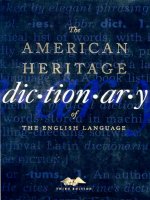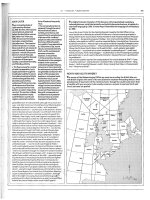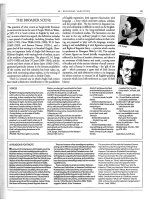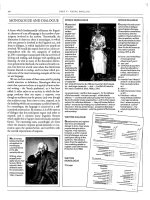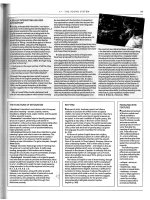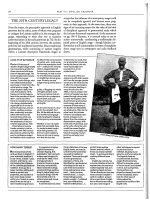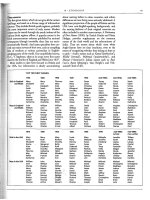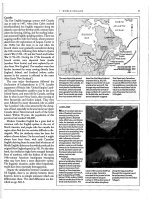American Heritage Dictionary of the English Language
Bạn đang xem bản rút gọn của tài liệu. Xem và tải ngay bản đầy đủ của tài liệu tại đây (42.76 MB, 8,652 trang )
INTRODUCTION
A
lmost a quarter of a century ago a new dictionary bearing the name
American Heritage
appeared. That book was notable because it did four things and
it did them well. It faithfully recorded the language in easily understood definitions.
It provided guidance toward accuracy, precision, and grace in the use of English
that intelligent people need and seek in a dictionary. It traced, whenever possible,
the development of English words to their origins and keyed many to an Appendix
of Indo-European Roots. And it presented complex lexical data in a typographically
attractive design accented by thousands of photographs and line drawings in spa-
cious margins.
The American Heritage Dictionary of the English Language, Third Edi-
tion
, builds upon this distinguished, innovative foundation.
The pages of the Third Edition, a lexicon of more than 200,000 boldface
forms, hundreds of thousands of meanings, and nearly 4,000 pieces of art, reflect
the rich and varied texture of American English as it has been used over time by a
broad group of educated speakers. This Dictionary is the product of four years of
work by 175 contributors. In preparing the Dictionary, our editors have had access
to a database containing hundreds of millions of lines of text that could be searched
for any word in context.
The A-Z vocabulary, containing more than 16,000 words and meanings new
to this Edition, is a comprehensive, detailed record of the language. Use of citations
allowed the editors to identify new words and new meanings, identify levels of us-
age, and select more than 4,000 quoted illustrations from nearly 2,000 sources for
use in exemplifying entry words in printed context. The quoted illustrations range
from the works of Shakespeare, Pope, and Ruskin to the works of contemporary
writers such as Joyce Carol Oates, Joan Didion, John Updike, and Tom Wicker.
More than 30,000 nonquoted illustrative examples were also derived from study of
the citations. Finally, the citations were used to determine the status of variants. For
example, 4,000 electronic citations were accrued for the spelling
ambiance
and
about 2,000 were found for the variant
ambience
. On the basis of this 2:1 ratio the
Dictionary gives
ambience
as an "unequal," or less frequently occurring, variant of
the entry word
ambiance
.
If language is a reflection of the ethos of the generation speaking it, then the
new entries and meanings in this Edition have much to say about us and our time.
The great majority of the new words relate to social and life patterns; to the life sci-
ences with an emphasis on health, medicine, genetics, and ecology; and to the phys-
ical sciences with an emphasis on computer technology and electronics, physics,
and astronomy.
The goal of the Third Edition is to provide the user with comprehension and
appreciation of the language in a readable manner. Keeping the needs of the con-
temporary user in mind, we have presented the central and often the most fre-
quently sought meaning of a word first. The definitions are worded in concise,
lucid prose without the specialized terms and abbreviations that make most dictio-
naries forbidding and confusing.
The Third Edition contains more than 500 notes and comments on matters of
grammar, diction, pronunciation, and levels and nuances of usage. Citations were
used in identifying new and evolving usage problems, attesting and evaluating the
currency of certain usages, studying various levels of usage, and evaluating their so-
ciolinguistic implications. The 173-member Usage Panel, with 75 new members
and chaired by Geoffrey Nunberg, a linguist associated with Stanford University,
has made an important contribution to the content and direction of the Usage
Notes through responses to periodic surveys developed by the Chair and the editors.
The Usage Panel of the Third Edition consists chiefly of writers, editors, and schol-
ars, 22 of whom are professors of linguistics or English. Other Panelists occupy dis-
tinguished positions in law, diplomacy, government, business, science and
technology, medicine, and the arts. Eighteen are recipients of the Pulitzer Prize and
one is a Nobel Laureate. These men and women, who reside in 28 states across the
land and in Canada and England, are a cross section of today's critical, literary, and
scholarly community.
A list of usage issues—old and new—was prepared by the Chair and the edi-
tors, and from it the usage program for the Third Edition was developed. Some of
the usage issues are entirely new. An example is the Note at
world-class
. Other issues
discussed in previous editions were resurveyed. An example is the use of
contact
as
a verb. In some instances the Panel's views are more conservative than in the past:
only 27 percent of the current Panel accepts
hopefully
as a sentence adverb, a usage
that in 1969 was acceptable to 44 percent of the Panel. Other Notes, such as the one
that discusses the use of
above
as a noun, present guidance and linguistic analysis
without Panel opinions. The Usage Notes are not confined solely to matters of sty-
listic excellence. Our concern with usage extends to issues of gender, ethnicity, and
sexual preference.
Considerable attention is devoted in this Edition to the history of words. The
etymologies have been thoroughly revised and expanded by a group of 25 specialists
whose work reflects original scholarly research in many fields, including African,
Persian, Turkish, and Native American languages. Special symbols, abbreviations,
and complex technical vocabulary have been avoided in the etymologies. More than
400 word history paragraphs, most of which contain dates of first occurrence of the
words in English, appear at entries with especially interesting etymologies. These
word histories, such as the one at
nerd
, provide a social, historical, and cultural con-
text for the evolution of words and explain the various linguistic processes that con-
tribute to the development of language.
A great many Modern English words can be traced to the reconstructed ances-
tral language called Proto-Indo-European. The etymologies in the Third Edition,
like those in the First, trace many words to their earliest ascertainable origins, usu-
ally in Proto-Indo-European, by means of cross-references to a new and thorough-
ly revised Appendix of Indo-European Roots. The Appendix, in a major departure
from previous style, gives the root followed by a brief gloss and a list of some of the
Modern English words derived from it. The individual roots entry then follows. For
example, the Modern English words
fierce
, and
treacle
, at first glance strange se-
mantic companions, both derive from the root
*ghwer-
, "wild."
The Third Edition contains hundreds of labeled words and meanings whose
occurrence is restricted to certain areas of the United States. An important new fea-
ture unique to the Third Edition is the inclusion of more than 100 Regional Notes
that explore the various linguistic and historical processes contributing to the de-
velopment of these terms. These processes are apparent in the Regional Notes at en-
tries such as
absquatulate
.
In an effort to assist the reader in using the language with color, vitality, and
freshness, the Third Edition devotes more attention than ever before to synonymy
by including more than 900 synonym paragraphs. The fully cross-referenced syn-
onym paragraphs are of two kinds. The first, liberally illustrated with quotations,
discriminates shades of meaning. The second kind lists exact synonyms, that is,
words sharing a common irreducible element of meaning, and provides antonyms
when applicable.
The American Heritage Dictionary of the English Language, Third Edition
, like
the First, is the product of significant advances in the use of computer technology.
The Third Edition is derived from a complex, highly versatile structured database.
Every element in the Dictionary was parsed, examined, and coded to reflect its lex-
ical function and position within the base. In combination, these elements form
dictionary entries, and on a broader scale they reflect a multitude of relationships
across the lexicon. Use of the database in connection with electronically generated
citations places the Third Edition a generation ahead of other dictionaries.
It is no longer possible for a few general editors working strictly within a pub-
lishing house to compile a true and accurate record of the language as it is used to-
day. Semantic, etymological, linguistic, and technical complexities inherent in the
language require the counsel of specialists from many disciplines. These specialists'
names are listed under Special Contributors and Consultants. We wish to thank all
of them for helping us in our pursuit of accuracy and truth. Special thanks go to
John Simpson, Co-Editor of the
New Oxford English Dictionary
, for valuable com-
ments made during the early stages of the project. And to all members of the Edi-
torial Staff who gave unstintingly of their time and expended great effort in the
development of the Third Edition, we express our deepest gratitude.
Anne H. Soukhanov
EDITORIAL AND
PRODUCTION STAFF
EDITORIAL STAFF
E
XECUTIVE
E
DITOR
Anne H. Soukhanov
S
ENIOR
L
EXICOGRAPHER
David A. Jost
S
ENIOR
C
OORDINATING
E
DITOR
Kaethe Ellis
M
ANAGING
E
DITOR
Marion Severynse
V
ICE
P
RESIDENT
AND
D
IRECTOR
OF
E
DITORIAL
, A
RT
,
P
RODUCTION
,
AND
M
ANUFACTURING
S
ERVICES
Margery S. Berube
P
UBLISHER
Jonathan P. Latimer
S
ENIOR
E
DITORS
Joseph P. Pickett, David R. Pritchard, David M. Weeks
E
DITOR
Joseph M. Patwell
A
SSOCIATE
E
DITORS
Jim A. Craig, Donna Cremans, Paul G. Evenson, Susan M. Innes,
Nina Judith Katz, James P. Marciano, Martha Fairman Phelps,
Rosemary E. Previte, Hanna Schonthal
A
SSISTANT
E
DITORS
Michael H. Choi, Ann-Marie Imbornoni, Daniel G. Prior
E
DITORIAL
A
SSISTANT
Laura P. Chesterton
A
DMINISTRATIVE
A
SSISTANCE
Kenneth C. Carpenter, Jennifer L. Crawford, Beth Jaffe, Craig LaPine, Margaret M.
May, Laurie A. McCrohon, Cara Murray, Rebecca A. Parker,
Heidi Stahl, Alisa Stepanian
C
ONTRIBUTING
E
DITOR
, S
YNONOMY
Anne D. Steinhardt
C
ONTRIBUTING
E
DITOR
, P
RONUNCIATION
Rima Elkin McKinzey
C
OORDINATING
E
DITOR
, D
ICTIONARIES
Pamela Burton DeVinne
C
ONTRIBUTING
E
DITORS
Ihsan A. Al-Shehbaz, Elizabeth J.W. Baer, Ethan Balk, John K. Bollard,
Carol J. Botteron, Guy J. Buckle, Karen Ann Cenci, Mary Lynn Czymbor, Ronald E.
Doel, Leon A. Feldman, Nancy Fliesler, Ian A. Grable,
David S. Greenes, Michael K. Hahn, Kristin Hanson, W.M. Havighurst,
Paul G.K. Jodka, Elizabeth A. Jordan, Victoria M. McClellan,
Ramona R. Michaelis, Sonja N. Nelson, Trudy Nelson, Barry John Perlman, Richard
E. Plotkin, Lois J. Principe, David C. Roberts, Paul R. Schwankl,
James E. Shea, Jeffrey E. Topal, Monica L. Zangwill
C
ITATIONS
C
LERK
Shari Lynn Wheeler
C
OPYEDITING
Frances Barna, Alice P. Carman, Maria A. Morelli
P
ROOFREADING
Kathryn Blatt, Becky Cheston, Jennifer L. Dougherty, Judith L. Drummond, Valerie
A. English, Bruce E. Frost II, Stella Gelboin, Rhonda L. Holmes, Katherine M.
Isaacs, Eric C. Meyer, Maria Rodriguez Montenegro,
Denis Moynihan, James F. Mulhern, Jill R. Norton, Lori Ohliger,
Thelma Prince, Carole A. Ricciardi, Ann M. Rossi, A. Nancy Rourke
PRODUCTION STAFF
P
RODUCTION
AND
M
ANUFACTURING
M
ANAGER
Christopher Leonesio
P
RODUCTION SUPERVISOR
Patricia McTiernan
S
ENIOR ART AND PRODUCTION COORDINATOR
Margaret Anne Miles
D
ATABASE KEYBOARDING
Miriam E. Palmerola, Supervisor
Lawrence Annucci, Edward Coleman, Cary Hawkins Doran,
Kathleen R. Klingenberg, Sean Brosnahan Meehan, Donna Whiting
M
ANUFACTURING SUPERVISOR
Greg Mroczek
S
ENIOR MANUFACTURING ASSISTANT
Jill M. Lazer
A
DMINISTRATIVE ASSISTANCE
Christina M. Granados, Lauren B. Hunnewell
DATABASE DEVELOPMENT AND COMPOSITION SERVICES
Auto-Graphics, Inc.
Paul Cope, Vice President, Publishing Operations
Robert Eiferd, Manager of Programming
Kathi Pittman & Laura Stein, Project Managers
S
TRUCTURED DATABASE DESIGN
Joseph V. Gangemi, Consultant
In Remembrance
Jim A. Craig
1961–1991
Friend, Colleague, and Editor
SPECIAL CONTRIBUTORS
AND CONSULTANTS
USAGE
Geoffrey Nunberg, Ph.D.
Stanford University
DIALECT
Sr. Mary Dominic Pitts, O.P, Ph.D.
Aquinas Junior College
INDO-EUROPEAN ROOTS APPENDIX
Calvert Watkins, Ph.D.
Harvard University
LANGUAGE AND ETYMOLOGY CONSULTANTS
Patrick S. Diehl, Ph.D., University of California, Berkeley
Deborah W. Anderson, Ph.D., University of California, Los Angeles
Martin E. Huld, Ph.D., Department of English, University of California, Los
Angeles
Brian D. Joseph, Ph.D., Department of Linguistics, Ohio State University
Reuven Merkin, Ph.D., Professor, Academy of the Hebrew Language, Jerusalem,
Israel
African Languages
George N. Clements, Ph.D., Department of Modern Languages and Linguistics,
Cornell University
Austronesian Languages
R. David Zorc, Ph.D., Senior Linguist, MRM Language Research Center
Caribbean Languages
Richard Allsopp, Ph.D., Caribbean Lexicography Project, University of the West
Indies at Cave Hill, Barbados
Celtic Languages
Lionel S. Joseph, Ph.D., Harvard University
Central and South American Languages
Richard F. Townsend, Ph.D., Department of Africa, Oceania, and the Americas, Art
Institute of Chicago
Hipólito Rafael Chacón, M.A., Department of Art History, University of Chicago
Dialect
Craig M. Carver, Ph.D., Dictionary of Regional American English
East Asian Languages
Stephen A. Bladey
Thomas Creamer, M.A.
English Language and Linguistics
G.W. Abernethy, Middle English Dictionary
Sara E. Kimball, Ph.D., Department of English, University of Texas at Austin
Henry Kucˇera, Ph.D., Department of Linguistics, Brown University
Marilyn S. Miller, M.S.L., Middle English Dictionary
Robert N. Mory, Ph.D., Middle English Dictionary
Lee Pederson, Ph.D., Department of English, Emory University
David W. Ruddy, M.A., University of Michigan
David M. Yerkes, Ph.D., Professor of English, Department of English, Columbia
University
Greek and Latin
Vincent P. McCarren, Ph.D., Middle English Dictionary
Rex E. Wallace, Ph.D., Classics Department, University of Massachusetts, Amherst
Roger D. Woodard, Ph.D., Classics Department, University of Southern California
North American Indian Languages
Ives Goddard, Ph.D., Department of Anthropology, Smithsonian Institution
Russian, Persian, and Ural-Altaic Languages
Alexander Lehrman, Ph.D., Department of Foreign Languages and Literatures,
University of Delaware
Science Etymology
Sharon L. Marshall, Ph.D., M.D., Harvard and Tufts Universities
Yiddish
Marvin I. Herzog, Ph.D., Department of Linguistics, Columbia University
SPECIAL CONSULTANTS
Architecture
Edward F. Ford, M.Arch., Associate Professor of Architecture, School of
Architecture, University of Virginia
Art
H. Kristina Haugland, M.A., Assistant Curator, Costume and Textiles, Philadelphia
Museum of Art
Cinema
P. Adams Sitney, Ph.D., Professor of Visual Arts in the Council of the Humanities,
Princeton University
Dance
Mara Peets, M.A., Teaching Fellow, Expository Writing Program, New York
University; Writer/Researcher and Assistant Director, Video Dictionary of
Classical Ballet
Economics, Business, and Finance
David L. Scott, Ph.D., Professor of Accounting and Finance, Valdosta State College,
Valdosta, Georgia
History and Government
John A. Garraty, Ph.D., Gouverneur Morris Professor Emeritus, Department of
History, Columbia University
Law
Robert M. Landis, J.D., LL.D., Partner and formerly Chair, Dechert Price & Rhoads
Meteorology
David B. Johnson, Ph.D., National Center for Atmospheric Research, Boulder,
Colorado
Military Science & Weapons
Daniel P. Bolger, Ph.D., U.S. Army Infantry Officer
Music
Mary Davenport, Professor of Music, School for the Arts, Boston University
Mythology
William S. Bonds, Ph.D., Associate Professor and Chair, Department of Classical
Languages, University of the South
Philosophy
Hilary Kornblith, Ph.D., Professor and Chair, Department of Philosophy,
University of Vermont
Religion
William A. Graham, Ph.D., Professor of the History of Religion and Islamic Studies,
Department of Near Eastern Languages and Civilizations, Harvard University
Van A. Harvey, Ph.D., George Edwin Burnell Professor of Religious Studies,
Department of Religious Studies, Stanford University
Martin E. Marty, Ph.D., Fairfax M. Cone Distinguished Professor of the History of
Modern Christianity, Divinity School, University of Chicago
Richard P. McBrien, S.T.D., Crowley-O'Brien-Walter Professor of Theology,
Department of Theology, University of Notre Dame
Paul Mendes-Flohr, Ph.D., Professor, Department of Jewish Thought, Hebrew
University, Jerusalem, Israel
Frank E. Reynolds, Ph.D., Professor of the History of Religions and Buddhist
Studies, Divinity School and Department of South Asian Languages and
Civilizations, University of Chicago
Jack D. Van Horn, Ph.D., Associate Professor, Department of Religion, College of
William and Mary
Science and Technology
Donald C.S. Allison, Ph.D., Professor and Head, Department of Computer Science,
Virginia Polytechnic Institute and State University
William Ira Bennett, M.D., Editor, Harvard Health Letter, Harvard Medical School
Sheila Ewing Browne, Ph.D., Professor of Chemistry and Chair, Department of
Chemistry, Mount Holyoke College
Neal D. Buffaloe, Ph.D., Professor Emeritus of Biology, University of Central
Arkansas
F.J. Collier, Curatorial Associate, Department of Invertebrate Paleobiology,
Museum of Comparative Zoology, Harvard University
Brooks B. Ellwood, Ph.D., Professor, Department of Geology, University of Texas at
Arlington
R.J. Emry, Ph.D., Research Paleontologist and Curator, Division of Vertebrate
Paleontology, Department of Paleobiology, National Museum of Natural
History, Smithsonian Institution
Frank Espey, M.D., Neurological Surgery (retired), Greenville, South Carolina
William S. Haubrich, M.D., Head, Division of Gastroenterology, Scripps Clinical
Research Foundation
Nicholas Hotton III, Ph.D., Curator, Division of Vertebrate Paleontology,
Department of Paleobiology, National Museum of Natural History,
Smithsonian Institution
Lynn Margulis, Ph.D., Department of Biology, University of Massachusetts at
Amherst
J.W. Pierce, Ph.D., Department of Paleobiology, National Museum of Natural
History, Smithsonian Institution
C.E. Ray, Curator, Division of Vertebrate Paleontology, Department of
Paleobiology, National Museum of Natural History, Smithsonian Institution
Richard Evans Schultes, Ph.D., Jeffrey Professor of Biology and Director, Harvard
Botanical Museum (Emeritus)
James Trefil, Ph.D., Clarence J. Robinson Professor of Physics, George Mason
University
Sociology
Mary Waters, Ph.D., John L. Loeb Associate Professor of the Social Sciences,
Harvard University
Sports
Robert W. Creamer, formerly Senior Editor, Sports Illustrated
Trademarks
Ted J. Murphy, International and Information Services Manager, U.S. Trademark
Association
THE USAGE PANEL
Geoffrey Nunberg, Ph.D. Chair
Department of Linguistics, Stanford University
Edwin Newman Chair Emeritus
Journalist; lecturer; author
Elie Abel Author and journalist; Professor Emeritus, Stanford University
Shana Alexander Writer
Cleveland Amory Humorist; humanitarian; President, The Fund for
Animals
Roger Angell Writer and Fiction Editor, New Yorker
Natalie Angier Science journalist; recipient, Pulitzer Prize
Isaac Asimov* Writer; Professor of Biochemistry, Boston University School
of Medicine
James Atlas Writer; Editor, New York Times Magazine
Margaret Atwood Writer
Kathryn H. Au Professor of Education, University of Hawaii
Louis Auchincloss Writer
Ralph Backlund* Senior Contributing Editor, Smithsonian; formerly
Producer and Executive Producer for news and public affairs, CBS; formerly
Associate Editor and Managing Editor, Horizon
John Bainbridge* Staff writer, New Yorker; columnist, Gourmet
Sheridan Baker Professor Emeritus of English, University of Michigan
Letitia Baldrige Author; lecturer on manners
Jacques Barzun Writer; literary consultant; educator
John Baugh Professor of Linguistics, Stanford University
Carolyn Wilkerson Bell Susan Duval Adams Professor of English,
Randolph-Macon Woman's College
Daniel Bell Henry Ford II Professor of Social Sciences Emeritus, Harvard
University; Scholar in Residence, American Academy of Arts and Sciences
Pierre Berton Canadian author and historian
Alton Blakeslee Science Editor (retired), Associated Press
Harold Bloom Writer; Sterling Professor of Humanities, Yale University; Berg
Professor of English, New York University; MacArthur Fellow
Roy Blount, Jr. Writer; Contributing Editor, Atlantic
Kallia H. Bokser Housing Consultant
Dwight Bolinger* Professor Emeritus of Romance Languages and
Literatures, Harvard University; Visiting Professor Emeritus of Linguistics,
Stanford University
The Hon. Julian Bond Formerly Georgia state legislator; Professor,
American University and University of Virginia; lecturer; host, public affairs
television program
The Hon. Daniel J. Boorstin Librarian of Congress Emeritus; recipient,
Pulitzer Prize and National Book Award Medal for Distinguished
Contribution to American Letters
Charles P. Boren Associate Editor (retired), Lewiston (Idaho) Morning
Tribune
Barbara Taylor Bradford Writer
The Hon. William W. Bradley U.S. Senator from New Jersey; formerly
professional basketball player
Leo Braudy Bing Professor of English, University of Southern California
Paul Brooks Writer; formerly Editor in Chief, Houghton Mifflin Company
Heywood Hale Broun Writer; actor; television newsperson
Rachel M. Brownstein Professor of English, Brooklyn College and the
Graduate Center, City University of New York
William F. Buckley, Jr. President, National Review Inc.
Gabrielle Burton Writer
Gerald Carson* Social historian; writer; advertising agency executive
Claudia Cassidy Writer; formerly music and drama critic, Chicago Tribune;
formerly critic at large, Chicago magazine
Walter C. Clemens, Jr. Writer; Professor of Political Science, Boston
University; Associate, Harvard University Center for Science and
International Affairs
Pat Conroy Novelist
Claire Kehrwald Cook Formerly Editorial Director, Modern Language
Association of America; author, Line by Line: How to Edit Your Own Writing
Robin Cook, M.D. Physician; writer
Alistair Cooke Journalist and broadcaster
Roy H. Copperud* Professor Emeritus of Journalism, University of
Southern California; columnist, Editor & Publisher; author of works on
English usage; recipient, Humanities Award, Association of American
Publishers
Norman Cousins* Adjunct Professor, School of Medicine, University of
California, Los Angeles; writer; formerly Editor, Saturday Review; formerly
Chair, Pulitzer Prize jury in literature
Malcolm Cowley* Writer; literary adviser, Viking Press, Inc.; formerly
Associate Editor, New Republic
Robert W. Creamer Writer; biographer; formerly Senior Editor, Sports
Illustrated
Gene D. Dahmen Attorney; past President, Boston Bar Association
Marshall B. Davidson* Writer; Senior Editor, Horizon; formerly Editor of
Publications, Metropolitan Museum of Art, New York
Robertson Davies* Writer; founding Master, Massey College, University of
Toronto; Professor of English and Drama
Lois DeBakey Writer, lecturer, and consultant; Professor of Scientific
Communication, Baylor College of Medicine
Vine Deloria, Jr. Standing Rock Sioux Tribe Professor of Law, Religious
Studies, Political Science, and History, University of Colorado
Joan Didion Author
Annie Dillard Writer; recipient, Pulitzer Prize
William K. Durr Professor of Education Emeritus, Michigan State University;
past President, International Reading Association
Andrea Dworkin Writer
Freeman J. Dyson Writer; Professor of Physics, Institute for Advanced
Study, Princeton, New Jersey
Anne Edwards Biographer and novelist; past President, Authors Guild
Gretel Ehrlich Writer; Guggenheim Fellow from Wyoming
Ralph Ellison* Writer; educator
Louise Erdrich Author
Carolly Erickson Historian; writer
Howard Fast Writer
Frances FitzGerald Writer; contributor, New Yorker; recipient, Pulitzer Prize
Elizabeth Frank Writer; Joseph E. Harry Professor of Modern Languages and
Literature, Bard College; recipient, Pulitzer Prize
Reuven Frank Author; columnist, New Leader magazine; formerly President,
NBC News; formerly Executive Producer, Huntley-Brinkley Report
John Kenneth Galbraith Economist; writer; formerly U.S. Ambassador to
India; formerly Paul M. Warburg Professor of Economics Emeritus, Harvard
University
Sara Garnes Linguist; Director of First Year Composition and Associate
Professor of English, Ohio State University
Michael G. Gartner Columnist, USA Today; editor, Ames (Iowa) Daily
Tribune; language columnist; formerly President, NBC News; past President,
American Society of Newspaper Editors; past chairman, Pulitzer Prize Board
Henry Louis Gates, Jr. Chair, Department of Afro-American Studies;
W.E.B. Du Bois Professor of Humanities, Harvard University
J. Edward Gates Lexicographer; editor; Professor Emeritus of English,
Indiana State University
A. Bartlett Giamatti* Sports executive; educator; Commissioner of
Baseball; formerly President, National Baseball League; formerly President,
Yale University
Francine du Plessix Gray Writer
Linda Gregerson Assistant Professor of English, University of Michigan
Patricia Hampl Writer; Professor of English, University of Minnesota
The Hon. Mark O. Hatfield U.S. Senator from Oregon
The Hon. S.I. Hayakawa* Writer; educator; President Emeritus, San
Francisco State University; formerly U.S. Senator from California
Mark Helprin Writer; Contributing Editor, Wall Street Journal; Senior Fellow,
Hudson Institute
Oscar Hijuelos Author; recipient, Pulitzer Prize, Rome Prize
Douglas R. Hofstadter College of Arts and Sciences Professor of Cognitive
Science and Computer Science; Director, Center for Research on Concepts
and Cognition, Indiana University, Bloomington; recipient, Pulitzer Prize
Gloria Hom Educator and consultant; Chair, Economics Department, Mission
College; member, California State University Board of Trustees; member,
Board of Trustees, Dominican College of San Rafael
Paul Horgan* Novelist, biographer, and historian; Professor Emeritus and
Author in Residence, Wesleyan University; recipient, Pulitzer Prize
The Hon. Shirley M. Hufstedler Senior Counsel, Morrison & Foerster;
formerly U.S. Secretary of Education; formerly Judge, U.S. Court of Appeals
for the Ninth Circuit
John K. Hutchens* Retired member, Editorial Board, Book-of-the-Month
Club; retired literary and drama reviewer, New York Times, New York Herald
Tribune, and Boston Evening Transcript
Molly Ivins Journalist; syndicated columnist; author
Jennifer James Cultural anthropologist; writer
Joyce Johnson Writer; recipient, National Book Critics Circle Award
William F. Johnston* Associate Professor and Newspaper Internship
Coordinator, School of Communications, University of Washington
Erica Mann Jong Poet, novelist, and essayist
The Hon. Barbara Jordan* Educator, attorney, and writer; Lyndon B.
Johnson Centennial Professor in National Policy, Lyndon B. Johnson School
of Public Affairs, University of Texas at Austin; formerly U.S. Representative
from Texas
June M. Jordan Poet; Professor of African American Studies and Women's
Studies, University of California, Berkeley
Alfred E. Kahn Robert Julius Thorne Professor of Economics Emeritus,
Cornell University; formerly Economic Adviser to the President of the
United States
Roger Kahn Author; journalist
Justin Kaplan Writer; recipient, Pulitzer Prize and National Book Award
Stanley Kauffmann Film critic, New Republic
Alfred Kazin Writer; Distinguished Professor of English Emeritus, the
Graduate Center, City University of New York
Trudy Kehret-Ward Educator; writer
Garrison Keillor Author and host of A Prairie Home Companion
Elizabeth T. Kennan Formerly President, Mount Holyoke College
Walter Kerr Drama critic (retired), New York Times; formerly drama critic,
New York Herald Tribune; past President, New York Drama Critics' Circle;
recipient, Pulitzer Prize
Jamaica Kincaid Author
Florence King Writer; critic
Maxine Hong Kingston Writer; recipient, National Book Award, National
Book Critics Circle Award, Anisfield-Wolf Race Relations Award, and PEN
USA West Award in Fiction
Galway Kinnell Poet; Erich Maria Remarque Professor of Creative Writing,
New York University; recipient, Pulitzer Prize, National Book Award
The Hon. Jeremy K.B. Kinsman Canadian Ambassador to Russia
The Hon. Jeane J. Kirkpatrick Diplomat; writer; educator; formerly U.S.
Ambassador to the United Nations
Maxine Kumin Writer; formerly Consultant in Poetry, Library of Congress;
recipient, Pulitzer Prize
Charles Kuralt Author; former CBS News correspondent
J.J. Lamberts* Professor Emeritus of English, Arizona State University;
author of works on English usage
Milton I. Levine, M.D.* Professor of Clinical Pediatrics, New York
Hospital Cornell Medical Center; radio commentator, CBS; formerly
syndicated columnist
Flora Lewis Senior Columnist, New York Times Syndicate
Robert E. Lewis Lexicographer; Editor in Chief, Middle English Dictionary;
Professor of English, University of Michigan
Sara Lawrence Lightfoot Professor of Education, Harvard University;
writer; recipient, MacArthur Prize
J. Anthony Lukas Author; journalist; recipient, Pulitzer Prize
Russell Lynes* Writer; formerly Managing Editor, Harper's
Claudine B. Malone Management consultant; formerly Associate Professor,
Harvard Business School
William Manchester Writer-in-Residence and Adjunct Professor of History
Emeritus, Wesleyan University; Fellow, Pierson College, Yale University
Robert Manning Writer; editor; formerly Editor in Chief, Atlantic
Richard Curry Marius Novelist and biographer; Director of Expository
Writing, Harvard University
Suzanne R. Massie Writer; lecturer on Russian history and culture; Fellow,
Harvard Russian Research Center
Armistead Maupin Author
Alice E. Mayhew Editorial Director, Trade Division, Simon & Schuster
The Hon. Eugene McCarthy Writer, poet, and lecturer; formerly U.S.
Senator from Minnesota
David McCord Poet; essayist; Honorary Curator of the Poetry and Farnsworth
Rooms, Harvard University Library
Kenneth McCormick Senior Consulting Editor, Bantam Doubleday Dell;
formerly Editor in Chief, Doubleday & Company, Inc.
Mary McGrory Journalist; columnist, Washington Post and Universal Press
Syndicate; recipient, Pulitzer Prize
Leonard Michaels Professor of English, University of California, Berkeley
James A. Michener Writer; recipient, Pulitzer Prize and Presidential Medal
of Freedom
Hassan Minor, Jr. Vice President for Government Affairs, Howard
University
Richard Scott Mitchell* Mineralogist; educator; writer; Professor of
Environmental Science, University of Virginia; Executive Editor, Rocks and
Minerals
Jessica Mitford Writer
Lance Morrow Essayist and Senior Writer, Time; recipient, National
Magazine Award
The Hon. Daniel Patrick Moynihan U.S. Senator from New York;
formerly Professor of Political Science, Harvard University
Cullen Murphy Managing Editor, Atlantic
The Hon. Maurine Neuberger Formerly U.S. Senator from Oregon;
formerly Oregon state legislator
Ambassador Thomas M.T. Niles U.S. Ambassador to Greece; formerly
Assistant Secretary of State for European and Canadian Affairs, U.S.
Representative to the European Community, and U.S. Ambassador to Canada
David Ogilvy, C.B.E. Advertising copywriter; Officer of the Order of Arts
and Letters (France); past Chair, United Negro College Fund
Cynthia Ozick Novelist; essayist; member, American Academy of Arts and
Letters
Robert S. Pirie Chairman and Chief Executive Officer, Rothschild Inc.
Alvin F. Poussaint, M.D. Clinical Professor of Psychiatry, Harvard Medical
School
Ellen F. Prince Professor of Linguistics, University of Pennsylvania
Jane Bryant Quinn Journalist; syndicated financial columnist, Newsweek
and Good Housekeeping
Tony Randall Actor
William James Raspberry Syndicated urban affairs columnist; Knight
Professor for the Practice of Journalism, Duke University; recipient, Pulitzer
Prize
Edward W. Rosenheim Editor; writer; Professor of English Emeritus,
University of Chicago
Judith Rossner Novelist
Leo Rosten Writer; social scientist; editor
Berton Roueché* Writer
Vermont Royster Writer; educator; Editor Emeritus, Wall Street Journal;
recipient, Pulitzer Prize
Carl Sagan David Duncan Professor of Astronomy and Space Sciences and
Director, Laboratory for Planetary Studies, Cornell University; scientist;
author; recipient, Pulitzer Prize
Robert Saudek Television producer; former Division Chief, Library of
Congress; Lecturer on Visual Studies, Harvard University; founding President,
Museum of Broadcasting
Antonin Scalia Supreme Court Justice
Arthur M. Schlesinger, Jr. Writer; historian; educator; formerly Special
Assistant to the President of the United States; recipient, Pulitzer Prize
Glenn T. Seaborg University Professor of Chemistry, University of
California, Berkeley; formerly Chair, U.S. Atomic Energy Commission;
recipient, Nobel Prize
Art Seidenbaum* Journalist; Editor, Opinion Section, Los Angeles Times
Harvey Shapiro Poet; Senior editor, New York Times Magazine
Elaine Showalter Professor of English, Princeton University
John Simon Drama critic, New York; film critic, National Review
Carlota S. Smith Centennial Professor of Linguistics; In Charge, Cognitive
Science Program, University of Texas
Jack Smith* Columnist, Los Angeles Times
Susan Sontag Writer
Theodore C. Sorensen Attorney; writer; formerly Special Counsel to the
President of the United States
Susan Stamberg Special Correspondent, National Public Radio
Wallace Stegner* Writer; founder and formerly Director, Stanford
University Writing Program; recipient, Pulitzer Prize and National Book
Award
Shane Templeton Foundation Professor of Curriculum and Instruction,
University of Nevada, Reno
Paul Theroux Novelist; travel writer
Elizabeth Marshall Thomas Writer
Nina Totenberg Legal Affairs Correspondent, National Public Radio and
ABC’s “Nightline”; panelist, “Inside Washington”
Elizabeth C. Traugott Professor of Linguistics and English, Stanford
University
Calvin Trillin Staff writer, New Yorker; columnist, Time
Anne Tyler Novelist; recipient, Pulitzer Prize
The Hon. Stewart L. Udall Writer; Chairman of the Board, The
Archaeological Conservancy, Santa Fe, New Mexico; formerly U.S. Secretary
of the Interior and U.S. Representative from Arizona
Helen H. Vendler A. Kingsley Porter University Professor of English,
Harvard University
Douglas Turner Ward Actor; playwright; recipient, Vernon Rice Award and
Obie Award
Calvert Watkins Victor S. Thomas Professor of Linguistics and the Classics,
Harvard University; past President, Linguistic Society of America
Fay Weldon Writer
Eudora Welty Writer
Jacqueline Grennan Wexler Writer; formerly President, Hunter College,
City University of New York
Tom Wicker Author; journalist; Editor, New York Times
Alden S. Wood Lecturer on Editorial Procedures, Simmons College; national
columnist on language and English usage
Richard A. Young Writer, editor, lecturer, and engineer; Publisher, Pollution
Engineering; Executive Director, National Registry of Environmental
Professionals
William Zinsser Writer, editor, and teacher; author of On Writing Well and
Writing to Learn
* We regret that these members of the Usage Panel have died.
A NATURAL HISTORY OF ENGLISH:
LANGUAGE, CULTURE, AND
THE AMERICAN HERITAGE
LEE PEDERSON
American speech and writing record the transactions of nearly 400
years of social history. Dialects embody patterns of sound, syntax, and meaning; lit-
erature documents those spoken forms in poetry and prose. Through the process of
communication, a native language becomes the social inheritance of its speakers. In
describing the linguistic resources of American English this Dictionary becomes a
cultural property book for all the American people.
A century before Noah Webster organized his first American dictionary
(1806), Jonathan Edwards defined the materials of inquiry in remarkably modern
terms, in words that should appeal to everyone, whether general reader or lexicog-
rapher:
By conversation, I mean intelligent beings expressing their minds one to another in
words, or other signs intentionally directed to us for our notice, whose immediate and
main design is to be signification of the mind of him who gives it.
Defining conversation as one might characterize language today, Edwards rec-
ognized the conceptual, symbolic, and functional aspects of human communica-
tion: the engagement of thought, the use of signs, and the transmission of ideas
from one mind to another.
Today the English language makes conversation possible among 350 million
native speakers who share its system of symbolic behavior. This number includes
speakers of American, Australian, British, Canadian, Irish, New Zealand, and Scots
English as members of the most influential speech community in the history of civ-
ilization. Their common cultural heritage makes possible the use of a single lan-
guage by the members of these different groups, but each national variety with all
its regional and social dialects reflects unique social experience. In a natural history
of a national language, the richest gatherings of such material endure in folk
speech the unaffected, conservative expression of common people, as preserved in
their oral traditions. National folk usage forms a subset of social dialects within
regional dialects that comprise the larger divisions, the national varieties of a lan-
guage.
Such experience makes a national vocabulary the most accessible and produc-
tive source of cultural information. Words are the complex linguistic structures
that transmit the native lexicon through the systems of sound, grammar, and mean-
ing. Words are also cultural emblems, symbols with social meaning that preserves
the experience of human activity. Ralph Waldo Emerson said that words are signs
of natural facts and wrote: “The etymologist finds the deadest word to have been
once a brilliant picture. Language is fossil poetry.” He demonstrated by his own
example, moreover, that words are also signs of sociohistorical facts by giving the
American meaning to transcendentalism. George Washington furnished the earliest
citations for Democrat and Republican and was the first to receive the designation
favorite son. Noah Webster made the earliest use of the phrase American English
with characteristic impatience but ultimate accuracy: “In fifty years from this time
[1806], the American English will be spoken by more people than all other dialects
of the language.” Such thought, conversation, and social interaction shaped the
national character and gave substance to the lexicon. Contributions came from
every sector of the American culture.
As the central component of American English culture, the national language
transmits the essential messages of all other cultural systems. All of these are insep-
arable from language: family (kinship and marriage), training (education and eco-
nomics), values (morality, ethics, and religious rites), government (political and
social control), technology (artifacts of survival), and fine arts (artifacts of the cre-
ative imagination and of spiritual expression). From the earliest days on its first
frontiers, American English carried forward the messages of the culture and the
experience of the past. As it did its work, the national language established an iden-
tity and expressed native ideas in an American voice. This Dictionary records that
American voice and gives substance to its underlying systems, language and culture.
Henry David Thoreau recognized a national dictionary as “a very concentrated
and trustworthy natural history of the people”:
What they have a word for, they have a thing for. A traveller may tell us that he thinks
they used a pavement or built their cabins in a certain form, or soaked their seed corn in
water . . . ; but when one gives us the word for these things, the question is settled, that
is a clincher. Let us know what words they had and how they used them, and we can infer
almost all the rest. The lexicographer not only says that a certain people have or do a cer-
tain thing, but, being evidently a disinterested party, it may be allowed that he brings suf-
ficient evidence to prove it. He does not so much assert as exhibit. He has no transient
or private purposes to serve.
THE HISTORICAL BACKGROUND OF AMERICAN ENGLISH
This natural history of the American people is the essential gift of the mother
tongue. With all speakers of the English language Americans share the results of
1,500 years of linguistic development, and English had itself evolved for a full mil-
lennium before the first American words were spoken in Virginia. Furthermore, as
a member of the Germanic language group of the Indo-European language family,
English shares an ultimate heritage with most of the modern languages of Europe
and Asia and with the official languages of every government in North and South
America.
The essential features of the Germanic languages are these: (1) a thoroughgo-
ing modification of the consonant system, especially the so-called First Germanic
Consonant Shift, which distinguishes the system from all other Indo-European
consonant patterns. It is captured in Grimm’s Law and accounts for the differences
between initial sounds in such cognate pairs as Latin/English pater/father, tu/thou,
and hortus/garden; (2) mutation of vowels by neighboring sounds (umlaut) and the
adaptation of the vowel system to express grammatical functions; (3) regular word
stress on the first syllable; (4) seven classes of strong (irregular) verbs, such as sing,
sang, sung; (5) three classes of weak (regular) verbs, such as love, loved, loved; (6)
strong and weak adjectives that disappeared in Medieval English but endure else-
where, as in Modern German and Norwegian definite and indefinite articles; and
(7) a core vocabulary of common words. These shared characteristics define the 13
modern Germanic languages: Danish, Faroese, Icelandic, Norwegian, Swedish,
German, Yiddish, Low German, Dutch, Afrikaans, Flemish, Frisian, and English.
The history of the English language begins with the arrival of Germanic invad-
ers from the continent, said to be in
A.D. 449 according to the Anglo-Saxon Chroni-
cle. In the eighth century the Venerable Bede identified these Germanic peoples as
Angles, Saxons, and Jutes. In Britain they encountered their Indo-European rela-
tives, the British Celts, who had settled in Britain centuries before. Like the Native
Americans, the Celts left their greatest linguistic legacy in place names, such as
Avon, Brynmawr (Welsh for “great hill”), Dover, Thames, and London. The Celts
and Germans, however, were never separated by a distance greater than the narrow
English Channel and shared a common Indo-European ancestry. Conversely, in
North America, native inhabitants and newcomers emerged from different envi-
ronments thousands of miles apart, from homelands distinguished by their native
forms of vegetation, animal life, and social behavior.
As the dialects of the invaders merged in England they gave rise to the
Northumbrian, Mercian, and Saxon varieties of the language that is called Old
English today. Three tenth-century texts show the close similarities of those dialects


